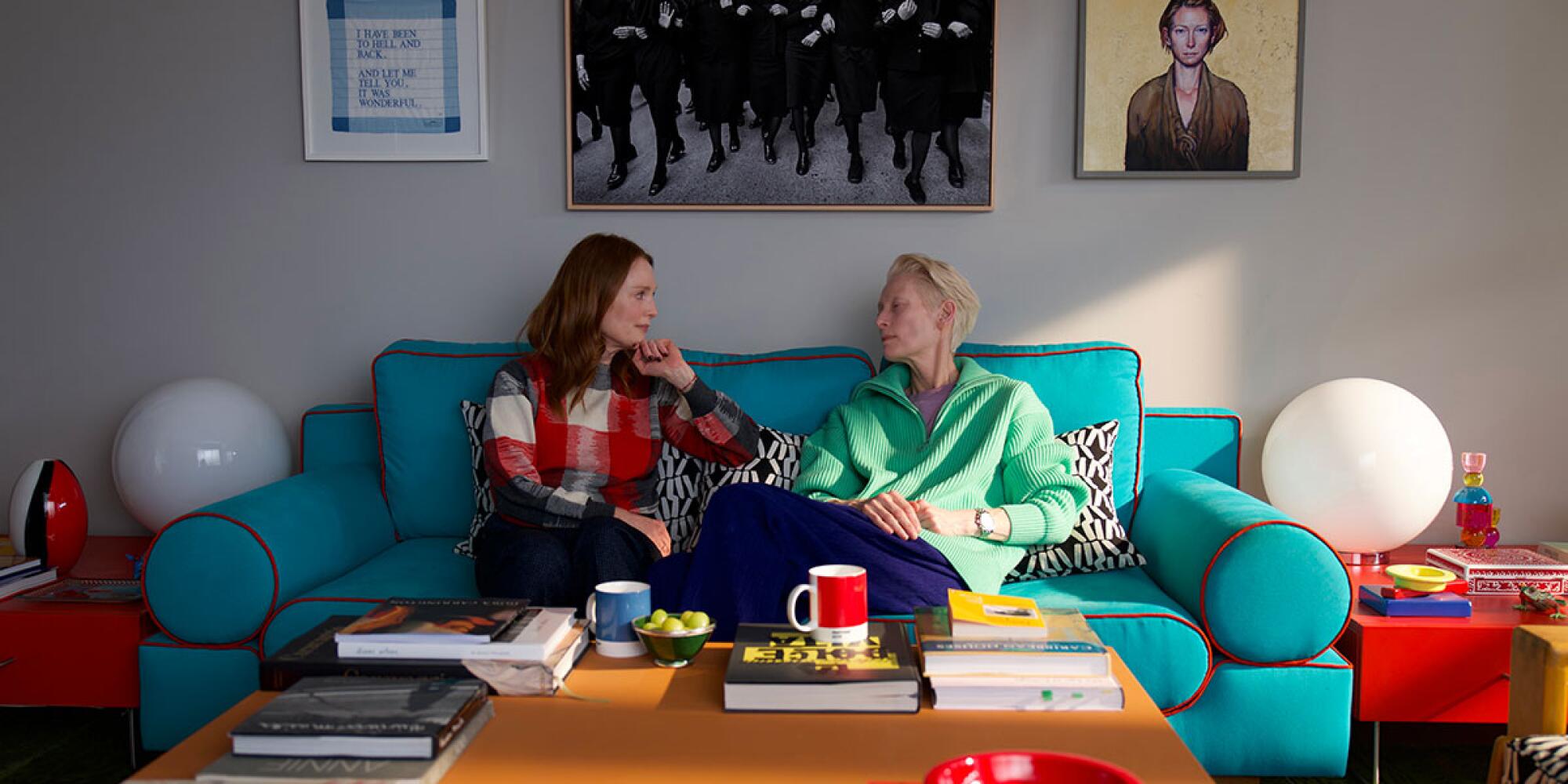When “The Room Next Door” premiered on the Venice Movie Pageant in early September, the rapturous viewers gave director Pedro Almodóvar and his two stars, Tilda Swinton and Julianne Moore, a standing ovation that observers mentioned was the longest at this 12 months’s occasion. The response presaged the movie’s Golden Lion victory on the pageant.
“It was such an outpouring of not just love but gratitude to Pedro,” remembers Swinton of the ovation, noting that the Spanish filmmaker was about to show 75 with greater than 20 characteristic movies beneath his belt. “He’s a punk rocker. He’s everlasting.”
“He’s an artist,” says Moore, “a great auteur. And it’s an opportunity for people to express that to him. And it kept coming and coming and coming and coming. It was really wonderful to be able to witness that.”
Primarily based on Sigrid Nunez’s 2020 novel, “What Are You Going Through,” the movie is an emotional two-hander starring Swinton as Martha, a profitable battle correspondent who discovers she is terminally in poor health. Taking issues into her personal fingers, she acquires a euthanasia capsule and a short-term rental on a rustic home the place she intends to finish her life. However she doesn’t wish to do it alone and asks a pleasant acquaintance, Ingrid (Moore), an writer and journalist, to accompany her to the home.
“The Room Next Door” is Almodóvar’s first characteristic in English, a language he’s not but comfy with. “He could make a film in Farsi or German or anything because he’s kind of not really that attentive to the language,” factors out Swinton. “There are other things he’s more attentive to — the emotion, really important.”
Throughout his childhood, Almodóvar generally sat and listened beneath the kitchen desk whereas his mom and different girls gossiped and shared secrets and techniques, Moore says. “He’s drawn to that point of view and that intrigue and that kind of drama,” she says. “He’s a man who recognizes female stories as being important.”
The director labored shortly, Swinton says, getting two takes at most, with the actors generally begging for 3. However the relentless tempo helped forge a bond between them.
“You have to go toward each other with your hands up,” remembers Moore. “It was like we were this ball that went into work every day, this ball of energy and exchange, constantly. And that’s what the movie is, a kind of partnership.”
With loss of life hovering over Swinton’s character, the tone generally acquired slightly heavy on set, however not overwhelmingly so. Discuss of mortality combined with questions on what’s for lunch. “When one is in the presence of someone who is coming to the end of their life, you can’t sit around being sad all the time,” advises Swinton. “There will be a moment when someone says, ‘You want something to eat? What was that hilarious film we saw?’ And we watch it. That is living. Living goes on even in dying.”
Julianne Moore and Tilda Swinton in Pedro Almodóvar’s “The Room Next Door.”
(TIFF)
Exhausting because it was to make the film, catharsis was its reward. “I’ve been in the Ingrid position,” Swinton says of Moore’s character. “I’ve been in the blessed position of supporting people at the end of their lives. It felt like there was this open possibility to take one’s own experience and put it in the film.”
Moore agrees, contemplating hardship an unavoidable a part of residing. “The sooner you acknowledge that, the more present you’re going to be. Knowing that things are tough and painful, you have to learn to coexist with it.”
The pair counsel the same strategy to anybody upset by the U.S. presidential election outcomes. “The chips are down, but that’s not necessarily a powerless place,” Swinton says. “It’s actually a very powerful state, because then people can think straight. It’s a beautiful day, we’re alive, and let’s live it and not be frightened.”
Moore agrees, including, “You experience difficulty and pain and hardship, and you see how unequal things are in the world and you wonder what you can do and how you can do it. You can’t give up.”

“I’ve been in the blessed position of supporting people at the end of their lives,” Tilda Swinton says. “It felt like there was this open possibility to take one’s own experience and put it in the film,” she says of “The Room Next Door” costarring Julianne Moore.
(Shayan Asgharnia/For The Instances)
Each girls are Oscar winners — Moore received the lead actress statuette for “Still Alice,” whereas Swinton scored the supporting trophy for “Michael Clayton” — however Sony Photos Classics is submitting each for the lead actress award for this movie.
“It’s just a point of accuracy,” says Swinton of the bizarre resolution. “This is a film in which there are two leading women, and they wrote down the truth. I would like to see Pedro up there.”
Almodóvar’s “All About My Mother” received the foreign-language movie Oscar, and he scored a statuette for his “Talk to Her” screenplay, however he has but to win a directing trophy (he was nominated for “Talk to Her”) or have one in all his movies nominated for finest image.
“Unfortunately, in America everything’s a competition,” Moore says. “We’re just happy to have a film that people want to see.”




